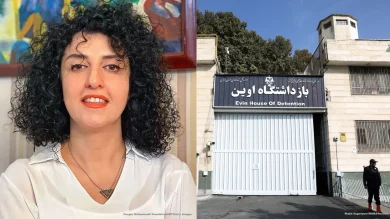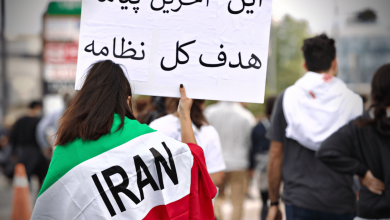The Islamic Revolutionary Guard Corps (IRGC) is not only Iran’s most powerful military institution—it’s also one of its wealthiest. From controlling ports and pipelines to running telecoms and factories, the IRGC has built a vast economic empire that funds its military, ideological, and terror operations both at home and abroad. This wealth doesn’t just sustain the regime—it actively fuels oppression, repression, and regional instability.
In this article, we uncover the hidden architecture of the IRGC’s financial empire: how it was built, how it operates, who enables it, and how its revenue fuels violence. Understanding the economic underpinnings of the IRGC is essential to dismantling its power.
1. Origins of the IRGC’s Economic Power
The IRGC was founded in 1979 to protect the Islamic Revolution. But after the Iran-Iraq War (1980–1988), it began acquiring economic power under the pretext of rebuilding the country. Under Supreme Leader Ali Khamenei, the IRGC was given contracts to reconstruct infrastructure—and from there, it expanded rapidly.
By the early 2000s, the IRGC had transformed into a multi-sector conglomerate operating under military immunity and political favoritism.
2. Khatam al-Anbiya: The IRGC’s Economic Engine
At the center of the IRGC’s empire is Khatam al-Anbiya Construction Headquarters, a behemoth founded in 1990 that serves as the financial arm of the IRGC.
What It Controls:
• Construction of oil pipelines, highways, dams, and railways
• Development of gas fields and petrochemical plants
• Telecommunications infrastructure
• Mining, agriculture, and real estate
With over 800 subsidiaries and thousands of shell companies, Khatam al-Anbiya:
• Wins no-bid government contracts
• Uses military logistics to undercut civilian competitors
• Avoids taxation and oversight
It is a state within a state, protected by the Supreme Leader and exempt from parliamentary scrutiny.
3. IRGC-Owned Businesses and Front Companies
The IRGC owns or controls stakes in dozens of major Iranian companies through opaque holding firms. Some of the most prominent sectors include:
A. Oil and Gas
• National Iranian Oil Company subcontracting to IRGC firms
• Shell companies used to circumvent sanctions and sell crude abroad
• Revenues redirected to Quds Force and proxy militias
B. Telecommunications
• Mobin Trust Consortium (owned by IRGC-affiliated entities) controls Iran’s largest telecom firm, including internet and mobile infrastructure
• Enables both surveillance and massive profits
C. Banking and Finance
• Ties to Mehr Bank, Ansar Bank, and other financial institutions
• Use of domestic banks to launder money and manage front businesses
D. Transportation and Shipping
• IRGC companies run key ports and logistics hubs (e.g., Bandar Abbas)
• Shipping lines used to move weapons and sanctioned goods
4. Illicit Revenue Streams
The IRGC supplements its official revenue through black market activity and smuggling.
A. Smuggling Networks
• Cigarettes, electronics, and banned imports are trafficked via IRGC-controlled border posts and ports
• Fuel smuggling is rampant, especially across Gulf states and Central Asia
B. Weapons Trafficking
• IRGC moves arms to Hezbollah, Hamas, Houthis, and Iraqi militias
• Uses commercial and diplomatic channels to avoid detection
C. Drug Trafficking
• Though publicly denied, IRGC elements have been linked to narcotics routes passing through Iran to Europe
D. Cybercrime
• IRGC cyber units have engaged in:
• Cryptocurrency theft
• Ransomware attacks
• Phishing campaigns targeting banks and NGOs
These operations generate hard currency and are difficult to trace.
5. Funding Repression at Home
The IRGC uses its economic power not just for profit—but to suppress dissent.
A. Surveillance Infrastructure
• Telecom revenues fund spying on citizens
• Khatam al-Anbiya builds smart cities and camera networks
B. Prison and Security Budgets
• IRGC controls key prisons and interrogation centers
• Resources allocated for crowd control tools, riot police, and facial recognition
C. Media and Propaganda
• IRGC-owned news agencies like Tasnim and Fars are funded through state and private deals
• Sponsorship of films, religious events, and ideological campaigns
This fusion of money and militarism means economic growth is not shared—it is weaponized.
6. Exporting Instability: Where the Money Goes
The IRGC funds a wide array of regional operations, mostly through its Quds Force, which receives a significant portion of the economic empire’s illicit funds.
A. Hezbollah (Lebanon)
• Up to $700 million annually, funding arms, salaries, and infrastructure
B. Hamas and Palestinian Islamic Jihad (Gaza)
• Weapons and cash smuggled via tunnels and shipping routes
C. Houthis (Yemen)
• Missiles, drones, and military advisors provided directly by IRGC
D. Iraqi Militias
• Includes Kataib Hezbollah and Asaib Ahl al-Haq
• Receive training, salaries, and equipment
These operations cost billions each year—and are made possible by the IRGC’s dominance over Iran’s economy.
7. Sanctions and the Struggle to Disrupt IRGC Finance
The international community has attempted to restrict IRGC revenue through sanctions—but enforcement is patchy.
U.S. Measures:
• Full designation of IRGC as a Foreign Terrorist Organization (FTO)
• Sanctions on IRGC leaders and front companies
• Seizure of assets and financial accounts
EU, UK, Canada:
• Sanctions on Quds Force and select IRGC entities
• No full IRGC designation (as of writing)
• Continued trade and investment with companies indirectly tied to IRGC
Challenges:
• Complex web of shell companies
• Use of proxies and regional actors
• Evasion via cryptocurrency and third-country trading
Sanctions can slow the IRGC—but without full global enforcement, they cannot dismantle its empire.
8. Who Enables the IRGC’s Wealth?
A. Iranian Political Elites
• The Supreme Leader’s office directly supports IRGC economic expansion
• Corrupt politicians ensure favorable laws and contracts
B. Foreign Partners
• Chinese, Russian, and some European and Asian companies have indirectly supported IRGC-linked entities
• Some continue to trade with front companies under new names
C. Diaspora Enablers
• Money laundering operations often involve agents operating in Western financial systems
• Dual nationals have facilitated transactions or technology transfers
Accountability must extend to enablers both inside and outside Iran.
9. Impact on Ordinary Iranians
While the IRGC grows richer, most Iranians suffer:
• Inflation, sanctions, and unemployment
• Cronyism makes upward mobility impossible without ideological loyalty
• Environmental damage from corrupt construction projects
• Repression funded by the very taxes and subsidies extracted from the public
The IRGC’s wealth is built on the public’s suffering.
10. Pathways to Dismantling the Economic Empire
To cut off the IRGC’s power, economic pressure must be targeted, consistent, and global.
A. Full Terrorist Designation (Globally)
• Makes all economic activity with IRGC entities a criminal offense
• Expands sanctions enforcement
B. Corporate Accountability
• Investigate and expose foreign companies doing business with IRGC fronts
• Enforce supply chain transparency
C. Financial Sector Reform
• Ban IRGC-linked banks from SWIFT and global transfers
• Freeze overseas assets of commanders and their families
D. Support Civil Resistance
• Fund economic alternatives for small businesses in Iran
• Encourage secure cryptocurrency tools for Iranian civil society
• Document and publish economic crimes
Conclusion: Money Is the Root of Their Power
The IRGC’s economic empire is not just a side hustle—it is the foundation of its power. Every prison built, protest crushed, or missile launched is underwritten by this corrupt network of businesses, banks, and smuggling routes.
Join Our Newsletter!
Stay informed with the latest updates, news, and ways to take action in the fight for justice and global security. Sign up now to get updates delivered straight to your inbox!




